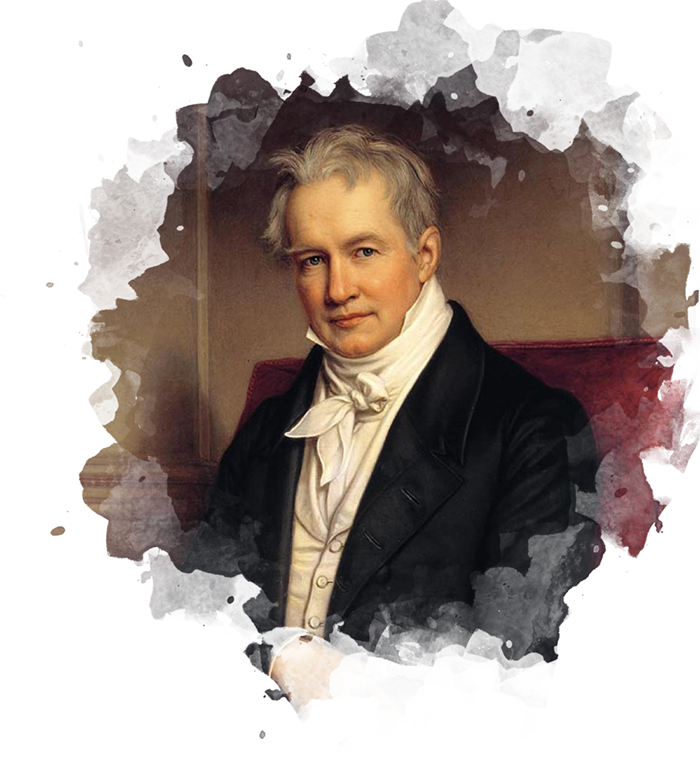The Vision of Alexander von Humboldt
„Everything is interaction and reciprocal“
Alexander von Humboldt (1769–1859) was a legend in his own lifetime, widely travelled, well-connected, highly educated, and empathetic.
He is often seen as the last of the great universal scholars. But if we look more closely, it becomes clear that he was actually ahead of his time. All his interests converged at a single point: the world conceived as a single whole. This meant he developed a perspective we would today call transdisciplinary. “Total impression” Humboldt, Alexander von: Ideen zu einer Physiognomik der Gewächse. Tübingen 1806, S. 11. http://www.deutschestextarchiv.de/book/view/humboldt_physiognomik_1806?p=11 oder auch Humboldt, Alexander von: Kosmos. Entwurf einer physischen Weltbeschreibung. Bd. 4. Stuttgart u. a. 1858, S. 8. http://www.deutschestextarchiv.de/book/view/humboldt_kosmos04_1858/?hl=Totaleindrucks&p=8 [*] was the aim of all his activity, measurements, observations. In this, he was a precursor of globalization. Ottmar Ette: Alexander von Humboldt und die Globalisierung. Frankfurt am Main / Leipzig 2009, S. 13ff.[*]
To develop a mental cosmos of such complexity, Humboldt was in constant contact with the leading minds of his time, through personal conversations and thousands of letters. ‘Cosmos’ was also the name of the treatise Humboldt published as a ‘physical description of the world’. It also represents his ultimate legacy.
The aim of the KOSMOSHumboldt project is to come closer to Alexander von Humboldt’s unique personality. With this in mind, we approach Alexander von Humboldt on three levels:
• Humboldt in his own words. (Level 1 – Inner Circle)
• Humboldt as his contemporaries saw him. (Level 2 – Middle Circle)
• We ask thinkers of our own time about the relevance of Humboldt’s approach today. (Level 3 – Outer Circle)
Propositions of Alexander von Humboldt.
Slavery

Nature’s understanding

Humboldt’s approach to research

Humboldt’s idea for his ‘Cosmos’ publication

Freedom

Humanism

His contemporaries about Humboldt
Charles Darwin
Born 12 February 1809 in Shrewsbury
Died 19 April 1882 in Downe

Johann Wolfgang von Goethe
Born 28 August in Frankfurt
Died 22 March in Weimar

“What kind of man is this! I have known him for such a long time and yet he forever astounds me anew. We could say, he is without peer when it comes to abilities and vital knowledge. And a multifaceted nature the likes of which I have never before encountered! Wherever one goes, he is at home, and showers us with intellectual treasures. He is like a fountain with many pipes, and all one has to do is hold out buckets wherever a refreshing and inexhaustible stream flows out.” http://www.sueddeutsche.de/wissen/zeitgenossen-ueber-humboldt-er-hat-ein-maul-und-kann-sich-geltend-machen-1.458109-5[*]
Prof. Dr. Justus von Liebig
Born 12 May 1803 in Darmstadt
Died 18 April 1873 in Munich

Simón Bolívar
Born 24 July 1783 in Caracas/New Granada
Died 17 December 1839 in Santa Marta/Gran Colombia

Napoléon Bonaparte
Born 15 August 1769 on Corsica
Died 5 May 1821 in Longwood House on Saint Helena in the South Atlantic

Friedrich von Schiller
Born 10 November 1759 in Marbach
Died 9 May 1805 in Weimar

Wilhelm von Humboldt
Born 22 June 1767 in Potsdam
Died 8 April 1835 in Tegel

Thomas Jefferson
Born 13 April 1743
Died 4 July 1826

Our contemporaries about Humboldt
Prof. Dr. Bénédicte Savoy
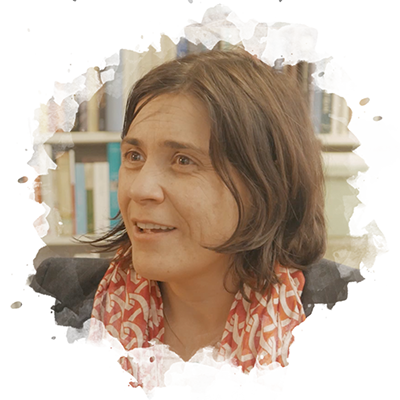
Dr. Savoy studied German literature and took her doctorate in art history. She was a junior professor at the Institute for History and Art History at the Technische Universität in Berlin. Since 2009, she has been professor of art history at that university.
She has received numerous awards for her outstanding scholarly achievements.
Her research currently focusses on the following areas: the transfer of art and culture in Europe, 18th and 19th century art, museum history, German-French relations, art theft and looted art.
Watch the videoProf. Dr. Matthias Glaubrecht
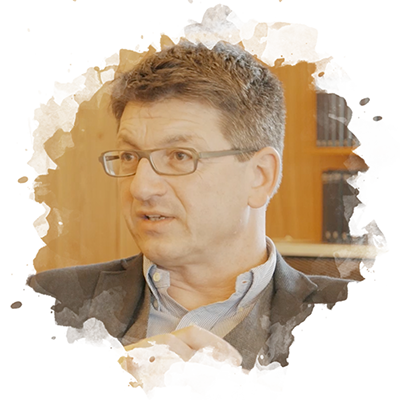
Matthias Glaubrecht studied biology at Hamburg University. After a temporary post at the Australian Museum in Sydney, he became a curator at Berlin’s Museum of Natural History, where he later directed the research department.
Watch the videoSofia Guevara Sueldo
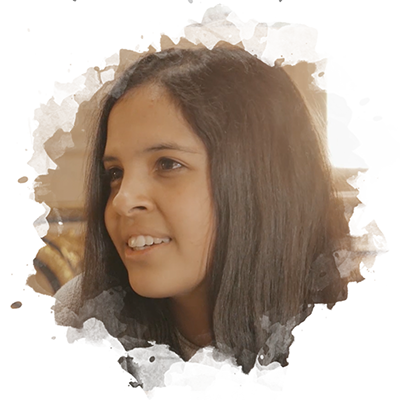
formerly a student of the Alexander von Humboldt School in Lima, Peru.
The visit by the Alexander von Humboldt-Schule to Lima introduced Sofia Guevara, in particular, to the scientific research of Alexander von Humboldt. She now intends to take a degree in pure biology.”
Watch the videoJulian Petrasch
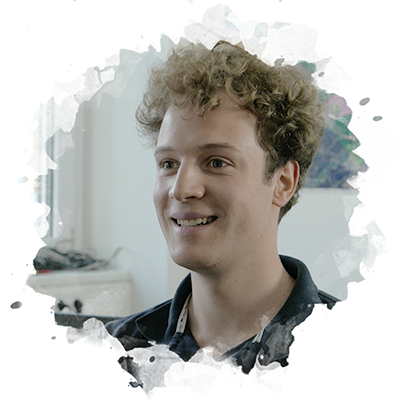
has been interested in astronomy since early childhood. Together with a school colleague, Lennart Schlieder, he developed SAMS (Sky Align Methods Simulator), a computer program to calculate the position of asteroids. This led to his becoming the winner of the German contest ‘Young People Researching’. He was also the winner of a second competition in 2013, in the specialist area of geography and spatial sciences. He describes his project there: “I can show that OSSI allows much cheaper professional images and far simpler data capture than satellites or aeroplanes.” His idea was to use balloons to transport cameras taking high-definition photographs of the earth. http://www.jugend-forscht.de/stiftung-jugend-forscht/historie/erfolgreiche-ehemalige/der-junge-galileo.html#prettyPhoto[*]
Watch the videoAndrea Wulf
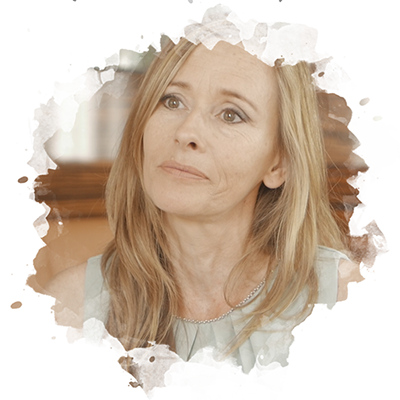
A historian, born in India, raised in Germany, and now living in London. For her book ‘Alexander von Humboldt and the Invention of Nature’, she not only went in search of manuscripts in archives across the world, she also journeyed to the remote places which had a powerful influence on Alexander von Humboldt’s view of the world and its phenomena. “The most exciting moment in my research was when I climbed Chimborazo in Ecuador […] with every step my admiration for Humboldt grew.”
Watch the videoProf. Dr. Bazon Brock
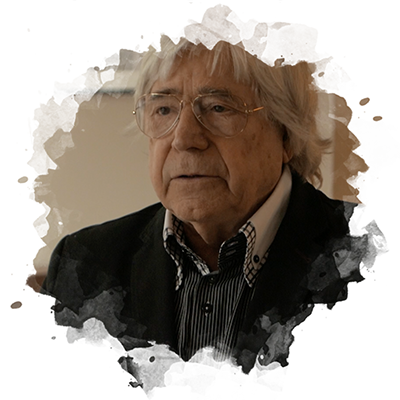
Artist, art theorist, and researcher on the borderlands of aesthetics, art, perception, and education. His biographical roots go back to the Fluxus movement. Together with Joseph Beuys and Wolf Vostell, he worked on redefining art and teaching. Today Brock is still concerned with the emancipation of the individual, communication, and education. This is the context in which we should understand the Visitor School, which he first staged at documenta 4 in 1968. On December 3, 2011, Brock opened the ‘Thinkery Responsible for Work on Unsolved Problems and Measures of the High Hand’ in the Kreuzberg district of Berlin.
Watch the videoProf. Peter Weibel
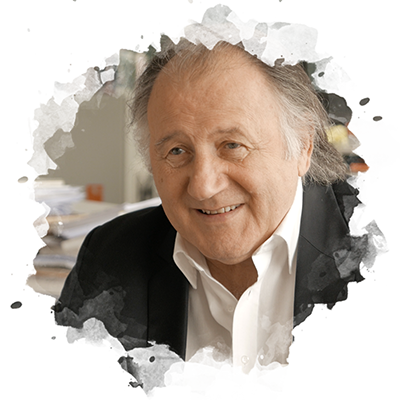
Artist, curator and media theorist. As the director of the Zentrum für Kunst und Medientechnologie (Centre for Art and Media Technology) in Karlsruhe, he advocates an approach which sees art, culture, technology and history as multiply interlocking and mutually influential systems. “Weibel’s sense of humour is the surest sign of the author’s confident command of every possible system and its medium – and at the same time, too, of his belief in the survival of mankind and of art in the age of digital media.” (Boris Groys about Peter Weibel http://www.peter-weibel.at/index.php?option=com_content&view=article&id=61&Itemid=39)[*]
Watch the videoProf. Dr. Ottmar Ette
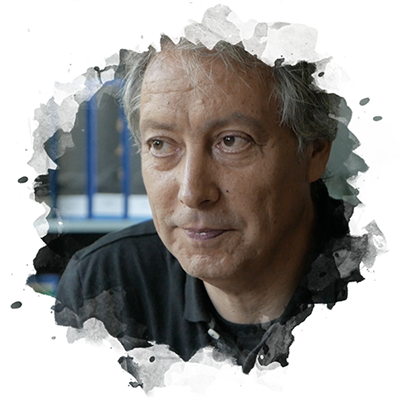
A scholar of Romance literatures and comparative literature, for several decades he has engaged on a number of levels with the life, thought, and work of Alexander von Humboldt. His approach is based on a profound knowledge of written sources, but his analysis goes far beyond established boundaries, whether disciplinary, philological, philosophical, media-historical, or literary-aesthetic. In this way, his work’s conceptual basis is also profoundly indebted to Humboldt’s thought.
Watch the videoProf. Dr. Heiner Bielefeldt
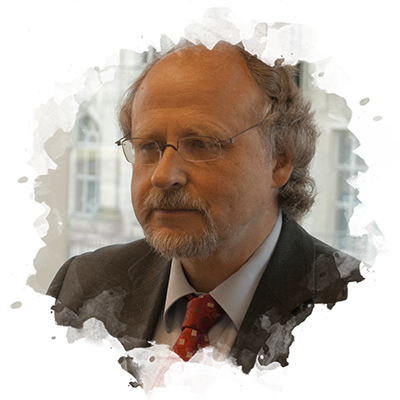
Philosopher and theologian, with a focus on human rights and the politics of human rights. From 2010 to 2016, he additionally served as UN Special Rapporteur on Freedom of Religion or Belief. In the context of his UN work, Bielefeldt saw time and again how progressive and farsighted Alexander von Humboldt’s worldview had been.
Watch the videoDr. Bonaventure Soh Bejeng Ndikung
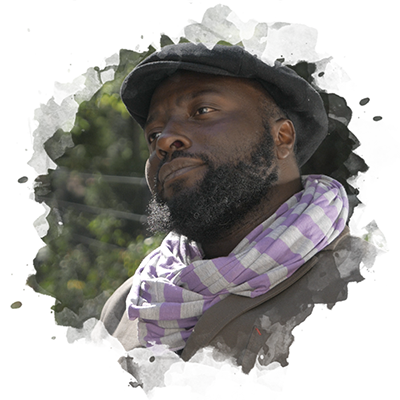
studied food biotechnology, medical biotechnology, and biophysics. He works as the curator and artistic director of the art space SAVVY Contemporary in Berlin. Working at the intersection of “Western art” and “non-Western art”, he is interested in “constantly discovering ways to combine art and science projects, exploring how these fields could mutually expand each other, and serve as a projectile”. http://www.synapse.info/profiles/bonaventure/[*]
Watch the video
